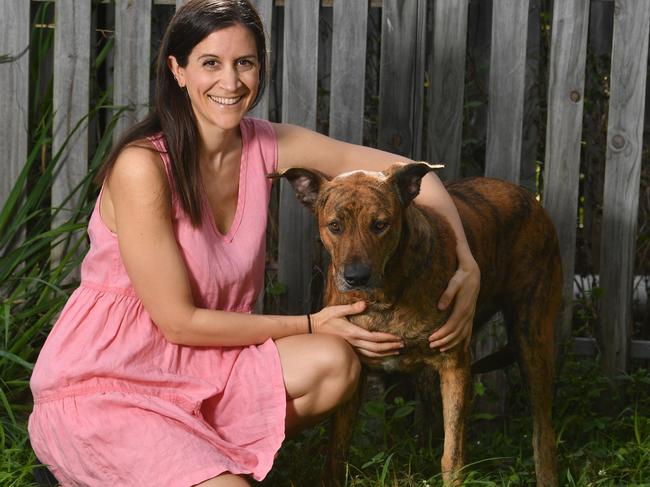Research: dog owners more resilient, cat owners more neurotic
Dr Jessica Oliva’s adoption of shelter dog Bonnie inspired her PhD research on human-dog bonding, focusing on oxytocin’s role and expanding into personality traits and mental health effects of pet ownership.

Townsville
Don't miss out on the headlines from Townsville. Followed categories will be added to My News.
Falling in love and adopting a shelter dog was a pivotal moment in the career for James Cook University senior psychology lecturer Dr Jessica Oliva.
She was about to start a PhD in Psychology from Monash University in Melbourne but that loving bond she felt with her new best friend Bonnie became the catalyst and new focus for her PhD as she strived to find an explanation for what had happened.
That moment changed the course of her career and since then she has published and co-authored numerous scientific papers – the majority examining different aspects of the human bond to dogs.
“The reason why I was interested in dogs is because, right at the time where I was about to start that PhD, or before I chose to do that PhD, I adopted a shelter dog, Bonnie.
“I got her from the lost dogs’ home in Melbourne, and I was just so overwhelmed by how much I fell in love with her, and I wanted to somehow quantify it.
“All these years down the track, I know that that’s not possible to measure in that way, it sort of transcends anything that you can measure in scientific measures.
“But that started off my love affair with dog research.”
Her PhD research investigated the role of the neuropeptide, oxytocin, in human-dog bonding and communication.
“My PhD was looking at the role of oxytocin, which is like the love hormone or the cuddle hormone.
It’s involved in partner bonding and mother infant bonding.
“But I was interested in looking at human dog bonding.
“My overarching theory was that through the evolution of the dog from the wolf, something happened to the oxytocinergic system that enabled them to be able to understand our social cues, and non-verbal social cues in particular, and to bond with us.”
That love affair with dog research still dominates her research but she has now expanded to include cats in her in her most recent co-authored July publication Unleashing the Personality Divide: Resilience in Dowg Owners, Neuroticism in Cat Owners.
The study concludes that inherent personality differences show that dog owners demonstrate resilience while cat owners tend to be more neurotic.
She said personality differences have been consistently shown between ‘dog people’ and ‘cat people’.
“Dog ownership has been associated with reduced loneliness in people living alone during periods of prolonged isolation, such as during covid lockdowns, suggestive of higher levels of resilience in dog owners.
“So our research investigated the predictive power of dog versus cat ownership on personality traits and resilience,” Dr Oliva said.
She said the current research followed up on a 2020 study done during the Covid lockdowns looking at the kind of buffering effect of pets on mental health and loneliness.
“We found that dog owners were significantly less lonely than people that didn’t have a dog, which included cat owners.

“Originally we theorised that was because people were getting out of the house that dog was acting as a kind of social catalyst to get their owners out of the house for walks or to the dog park, and so they were, incidentally, socialising with people doing the same thing.
“But then we did a follow up study looking at dog walking and loneliness, and we couldn’t find a link, and we also couldn’t find a link between frequency of dog interactions and loneliness.
“So it didn’t seem like that reduced loneliness had anything to do with the dog at all and so we thought maybe it’s to do with the personality profile of the person who owns the dog.
“Maybe people who choose to own dogs also happen to be more resilient.
“There had been some research done looking at the Big Five personality factors, so that’s extroversion, conscientiousness, agreeableness, intellect and neuroticism.
“We wanted to look at those as well, and then throw in a measure of resilience.
The researchers surveyed and interviewed 321 people who were dog or cat owners or neither.
“The two personality factors that came out different between cat owners and dog owners was neuroticism and resilience, with dog owners being more resilient and cat owners being more neurotic.”

Dr Oliva said when spent the lockdowns in Melbourne where there was a mass exodus of animals from the shelters.
“Everybody wanted to own a cat or a dog to keep them company during lockdown, which was great in some ways, that they were finding new homes.
“But they weren’t necessarily forever homes, because when the lockdowns ended, there was a lot of return of these animals back to the shelters, and that was quite sad, and for whatever reason that they weren’t socialized properly during lockdown, or just people you know were out and about doing what they used to do, and they no longer wanted to have an animal on board.
“I think the important thing to take away is, if you’re going to cope well with the stress of social isolation, you’re probably going to do that because you have a personality profile that supports it, whether you have a cat or a dog.
“If you’re not going to cope that well, if you’re going to be more susceptible to the negative effects of stress, then you’re probably going to do that whether you have a cat or a dog.
“So it’s not your kind of silver bullet (pet ownership) to coping with social isolation.”
She said it was important to put the different personality factors including resilience on a sliding scale instead of into categories.
“So you’re not just categorized as a neurotic person, just slightly higher maybe on that sliding scale of neuroticism.
“Neuroticism is sort of characterized by dealing with social stresses in a more perhaps negative way, or maladaptive way.
“It’s not yet necessarily a bad thing, but it’s just one of the ways that different ways that people differ in terms of how they handle stress.”
Dr Oliva’s love affair with dogs, and now cats, continues with her next scope of study in
collaboration with the RSPCA.
“We are looking at that longitudinal effect of pet ownership.
“We’re not looking at personality, but we’re more looking at the bond, and how the bond develops over time in cats, in cat and owners, and dogs and owners.
“Also how that may affect mental health indicators like depression, anxiety, stress over time, so over a one year period, but looking at different time points, three months, six months, one year.
“We’re hoping to see the timeline of how that bond develops over time and also when that bond starts to become stronger how is that impacting their mental health.”
But Dr Oliva said the decision to own a dog or acquire a dog or a cat should always be a really well thought out decision made with the commitment to look after the animal for the duration of its lifetime.
“Not because you think it’s going to give you some sort of immediate benefits for your mental health, because they’re probably the way that you deal with adversity is probably more inbuilt and about you than the animals.”
Originally published as Research: dog owners more resilient, cat owners more neurotic


